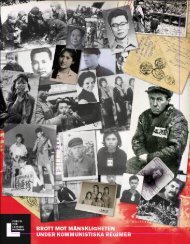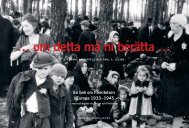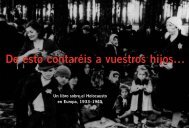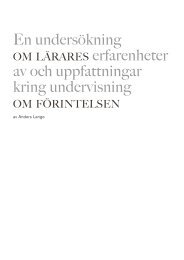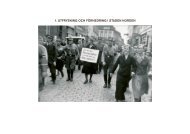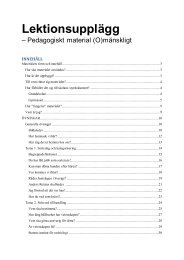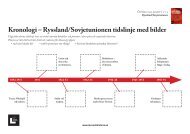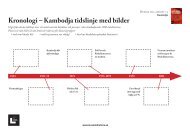Children…
Tell Ye Your Children... - Levandehistoria.se
Tell Ye Your Children... - Levandehistoria.se
- No tags were found...
Create successful ePaper yourself
Turn your PDF publications into a flip-book with our unique Google optimized e-Paper software.
swear an oath of allegiance to Hitler and Nazi Germany.<br />
This refusal to submit was remarkable, as merely signing<br />
a document would have spared them: few however<br />
chose this option. They were taken by the thousands to<br />
the camps, where some 25 per cent were killed.<br />
Some German youth also protested. One group was<br />
the Edelweiss Pirates, who formed “wild gangs”, or the<br />
“Swing Kids” (who danced to forbidden American jazz<br />
music). Despite frequent clashes between groups of<br />
Hitler Youth and the “Pirates”, the regime was initially<br />
unsure about how to handle such protests. Not until<br />
autumn 1944 did the authorities strike, and several<br />
“Pirate” leaders were hanged.<br />
Between June 1942 and February 1943, the “White<br />
Rose” movement was active in Munich and other cities.<br />
This small protest group was led by Alexander Schmorell,<br />
the Scholl siblings (Sophie and Hans) and their<br />
professor Kurt Huber of the University of Munich.They<br />
distributed leaflets condemning the Nazis and protesting<br />
against the mass murder of Jews and others. Caught<br />
by the Gestapo, they were tried and executed.<br />
During the regime’s early years, social democratic,<br />
communist and trade union groups organised resistance,<br />
but these networks were quickly destroyed. Though<br />
some individual members managed to resist until war’s<br />
end, most were either murdered, put in prisons or camps,<br />
or forced into exile. Right-wing national conservative and<br />
military elements failed to resist until after the war began.<br />
Some were motivated to resist because they wanted to<br />
save Germany from the threat of defeat, while others<br />
sought to distance themselves from mass murder.Among<br />
the latter was Helmuth von Moltke, a lawyer who was<br />
executed in January 1945. In a clandestine letter to a<br />
friend in England he described resistance in Germany<br />
as suffering from a “lack of unity, lack of men, lack of<br />
communications”. In other countries ruled by the Nazis<br />
even the ordinary criminal had a chance of being regarded<br />
as a martyr. In Germany, Moltke complained, the situation<br />
was reversed and even the martyr was “certain to be<br />
classed as an ordinary criminal”.<br />
The Rosenstrasse protest<br />
One remarkable protest against the Nazi regime<br />
occurred openly in Berlin in March 1943. Throughout<br />
the war, the regime hesitated to deport Jews married<br />
to non-Jews, fearing protests from the latter. When<br />
Jewish spouses were arrested in February, protests followed.<br />
Believing that their detained spouses were to be<br />
deported, thousands of women defied the Gestapo and<br />
the SS by gathering in front of the building where their<br />
husbands were detained.<br />
Charlotte Israel, a demonstrator whose husband<br />
was inside, later recalled what happened: “We bellowed,<br />
‘you murderers,’ and everything else that one<br />
can holler. (…) We didn’t scream just once but again<br />
and again, until we lost our breath.” Eventually, most<br />
of those detained were released. The actual reason for<br />
their release is debated by historians, as is the regime’s<br />
initial motivation for the arrests. However, all agree that<br />
the women demonstrated great courage by their public<br />
protest. Those few Jews who survived in Germany did<br />
so almost exclusively in mixed marriages.<br />
“There is an unsolved riddle in the history of the<br />
creation of the Third Reich. I think it is more<br />
interesting than the question of who set fire to<br />
the Reichstag. It is the question: ‘What became<br />
of the Germans?’ Even on the 5th of March<br />
1933 a majority of them voted against Hitler.<br />
What happened to that majority? Did they die?<br />
Did they disappear from the face of the earth?<br />
Did they become Nazis even at this late stage?<br />
How was it possible that there was not the<br />
slightest visible reaction from them?”<br />
SEBASTIAN HAFFNER (PEN NAME FOR RAIMUND PRETZEL),<br />
GERMAN AUTHOR AND JOURNALIST, AROUND 1939<br />
93



